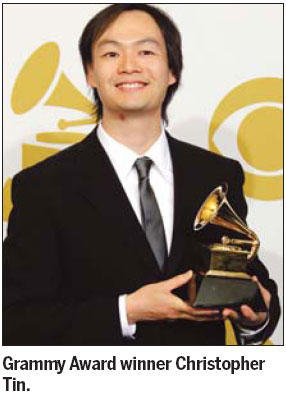People
Composer's win takes Chinese soprano to the Grammys
Updated: 2011-02-22 07:54
By Chen Nan (China Daily)
Minutes before Christopher Tin learned of his win at the 53rd Grammy Awards for his classical crossover album, Calling All Dawns, he was at the ice rink lacing up his skates. When the 35-year-old composer saw the first congratulatory e-mail, he was so excited that he went out and scored a hockey goal.
"(It offered) a great deal of relief, but then I immediately had to focus on my acceptance speech," he says.
 |
The two awards, for Best Classical Crossover Album and Best Instrumental Arrangement Accompanying Vocalist, have once again put the spotlight on China's musical talents. Chinese soprano Jia Ruhan sings the third track in the album, Dao Zai Fan Ye, or The Path is Returning.
Tin says he encountered Jia's voice on the Internet and really enjoyed her singing. "She was great to work with, and she was interested in the project as well," he says.
The song's idea is borrowed from Chinese Taoism and is a poem on the cyclical nature of life.
Tin, who is of Chinese descent, was born and raised in California and educated in England. Exposed to Chinese culture from a young age, Tin says he has always been interested in Chinese music.
"I know that lots of musicians from China and other countries are keen to make music with Chinese elements. I always love reading books about traditional Chinese culture and philosophy, and I am glad to spread them," he says.
According to the composer, every song on the award-winning album has musical elements from a different country.
"When I started planning the album, I knew I wanted 12 songs in 12 different languages. Mandarin was an easy one to select," says Tin, who spent four years composing and recording the album.
The 12 languages of his debut album include Swahili, Polish, French, Persian and Maori. The lyrics are also drawn from diverse sources, such as the Torah, the Bhagavad Gita, and ancient Persian and Japanese poetry, besides contemporary writers.
It was an enormous task and the most difficult thing, he says, was to find the right singers for the project.
"I obviously love mixing the cultural elements of music together. And the idea behind the 12 languages was to convey the similarities across cultures," he says.
The album was released in October 2009.
The message behind Calling All Dawns is "that even though we as a human species have different skin colors, speak different languages and follow different faiths, we're all still universally connected", Tin says.
Interested in music from childhood, he majored in music composition at Stanford University and Oxford University. But his musical career, spanning film, television, video games and advertising, is not about making a living, he says.
"Growing up, I kept all my options open, but even as I toyed with other career paths through college, such as law and architecture, I always just kept doing music. I take it for granted that music is there, eating, breathing and even sleepwalking. It's fun," he says.
Calling the Grammy win his biggest accomplishment, he says he plans to keep writing music.
"I have many other projects going on at the moment, and I am considering working on a China-related project. We'll see where it leads me," he says.
E-paper

Lingua franca
Chinese are learning English on a scale never seen before and the business of teaching is booming.
Golden run ahead
Looking abroad
Mapping out a plan
Specials

Sentimental journey
Prince William and Kate Middleton returned to the place where they met and fell in love.

Rent your own island
Zhejiang Province charts plans to lease coastal islands for private investments

Self-made aircraft
An automobile mechanic in Northeast China made a test flight of his self-made aircraft which cost about US$395.
